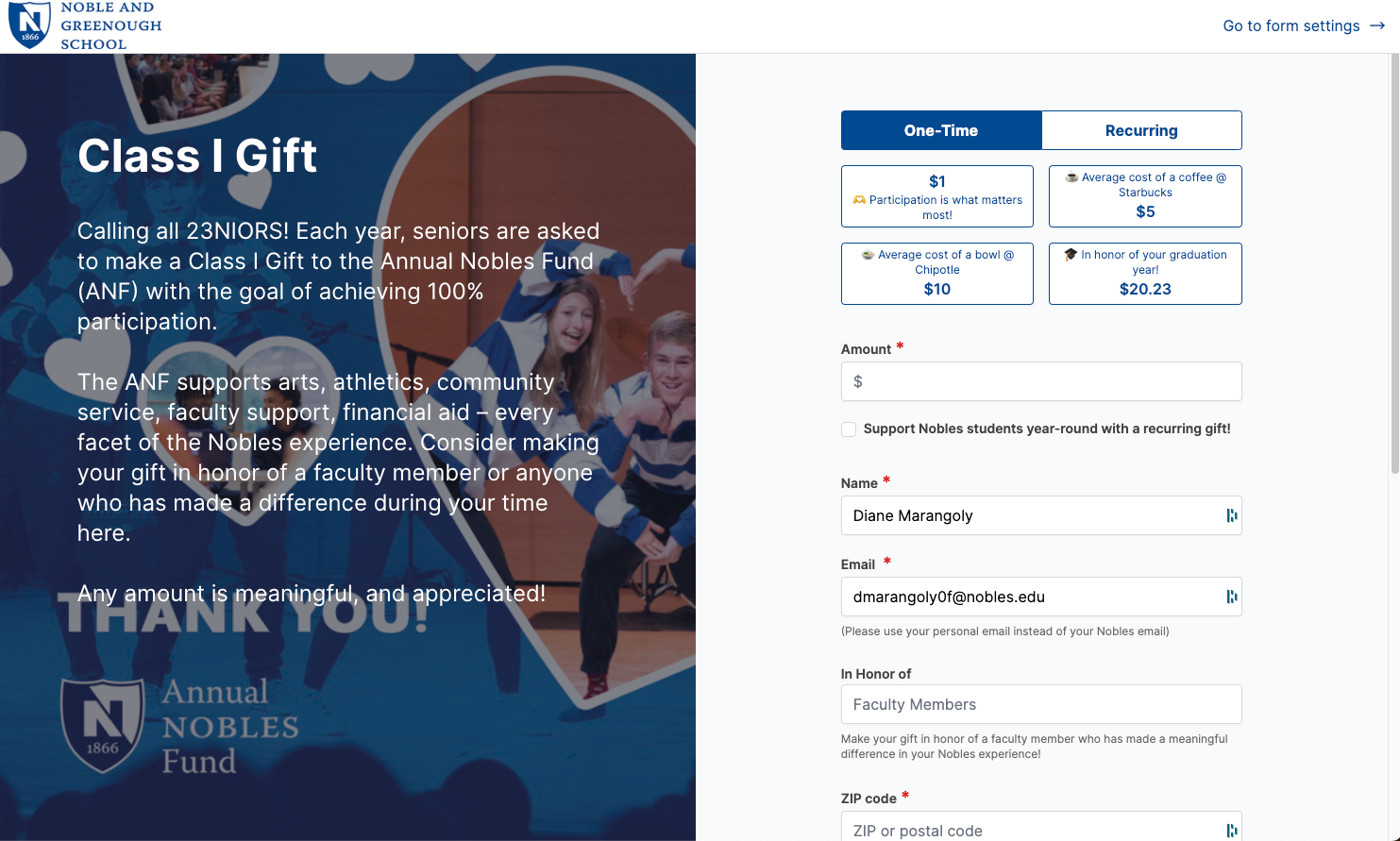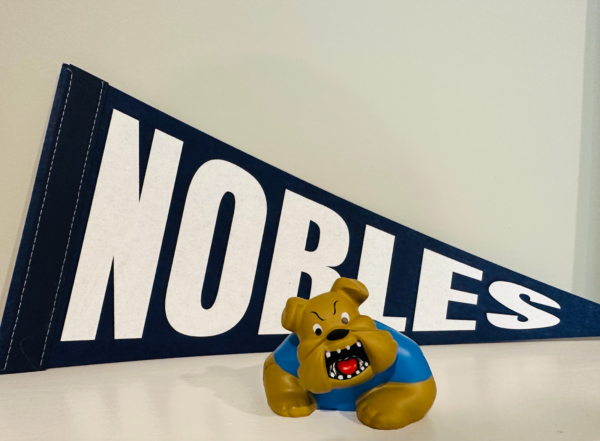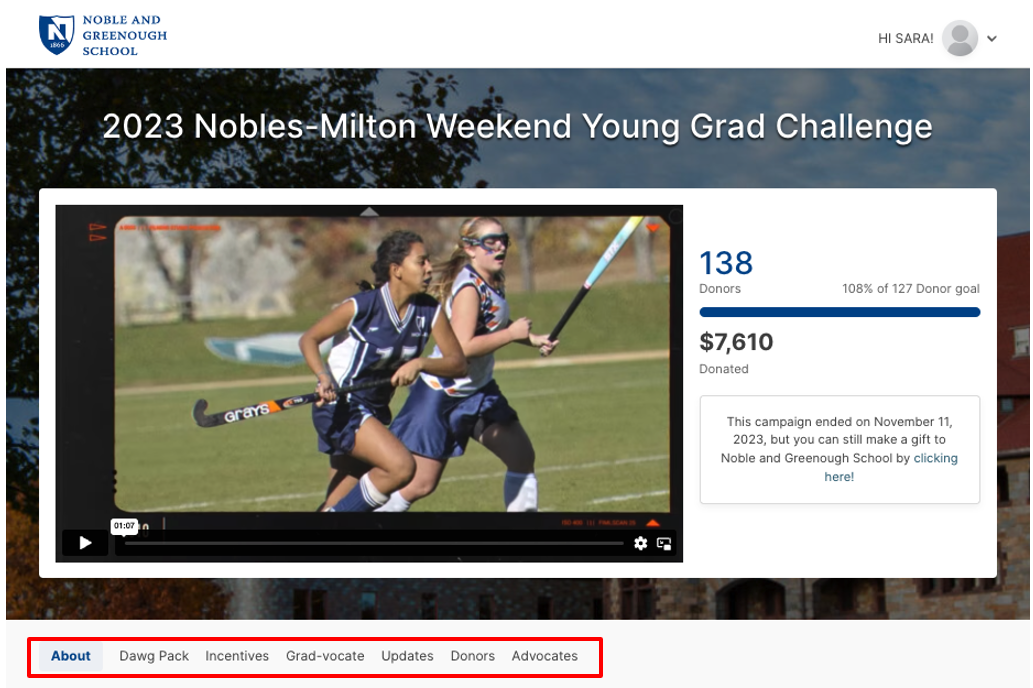Build a Culture of Giving Among Young Graduates to Boost Recurring Gifts
Establishing a robust recurring giving program has far-reaching benefits for your organization—from creating a dependable stream of donations to reducing the workload of your advancement team.
However, getting donors to opt-in to a recurring donation is not always easy. The key may lie in building a culture of giving among young donors.
The Noble and Greenough School, a co-ed boarding school in Dedham, Massachusetts, put a heightened emphasis on converting their young alumni into recurring donors—and their efforts paid off.
According to Sara DiCenso, the Annual Giving Coordinator at The Noble and Greenough School, over 20 percent of their 2023 senior class signed up for their recurring giving program—up 4 percent from the previous year.
So, how did The Noble and Greenough School achieve success in securing recurring donations?
At a GiveCampus Partner Success Day in Boston in the spring of 2024, their Development and Graduate Affairs team held a session during which they shared insight into how the team is creating a culture of giving at their institution and nurturing young supporters to become lifelong supporters.
When the Noble and Greenough School saw their young graduate participation rates decline, they knew they had to make a concerted effort to combat the “donors down, dollars up” trend in educational fundraising. So, they set their sights on a constituent group that had lots of room to grow—students—and began educating them early on about what it means to give back.
Read on to learn some of the key strategies their team employed to build out their recurring giving program.
Focus on Young Donor Participation
Narrowing your efforts on a specific constituent group allows you to create targeted campaigns that are more likely to resonate. Young donors offer a lot of potential when it comes to recurring giving. In the age of auto-payment and a subscription-based economy, these younger generations are already more comfortable with signing up for recurring payments.
Additionally, converting young alumni into recurring donors increases their lifetime value and is likely to boost retention.
Blog: What Drives Young Alumni To Give
Educate Your Future Donors
Before you can expect someone to make a gift to your institution—and a recurring gift at that—you’ll likely need to do some education up-front. This is especially true with younger donors. This newest generation of donors is a passionate and socially active group. However, they also value transparency when it comes to the causes they support.
Beyond wanting to ensure your institution is authentic and trustworthy, students and young donors may not understand how an annual fund works and what donations actually help to support.
“One thing we have to do is build relationships with our students,” said Diane Marangoly, the Director of the Annual Nobles Fund. “We try to engage in meaningful conversations with them. We ask them how the year is going and get them familiar with who we are and what the Annual Nobles Fund is.”
Throughout the school year, the Development and Graduate Affairs team hosts pop-ups for students to meet the team, learn more about what they do, and offer them a chance to sign up for their graduate portal. While they often entice their students with treats and freebies, it ultimately is about building relationships.
“It’s an open conversation where we can at least engage in some kind of dialogue where they can understand that fundraising is a big piece of our school,” said Marangoly.
During one such pop-up, which they hold during their annual Playing for Pink game, they have seniors write thank you cards to donors and give them a pink beanie in return. Beyond securing the coveted free swag, seniors also walk away with more insight into why people give to the school and the importance of sustaining these donations. The Development and Graduate Affairs team hopes this newfound knowledge will stay top of mind when it comes time for these students to become prospective young donors.

Create a Community Around Recurring Giving
Building a community element to your recurring gift program can motivate students to get involved and be a natural extension of pre-existing alumni groups.
The Noble and Greenough School created The Dawg Pack last year—a reference to the nickname students coined for their mascot. Leveraging a name that resonated with students helped make this group something alumni would actually want to be a part of.

In order to join, donors needed to set up a recurring gift for at least three years. The Development and Graduate Affairs team incentivized donors with fun freebies, including a branded stress relief squeezer shaped like a bulldog.

While this recurring gift community was not limited to young donors, seniors and recent grads were a primary target during its initial launch. During their Young Grad Challenge, DiCenso and Marangoly highlighted opportunities to get involved with The Dawg Pack in various spots on their campaign page.

Building a sense of community around the recurring gift program proved to be a success. Last year they had 26 out of their 121 graduating seniors sign up for The Dawg Pack—bringing recurring gift subscriptions up 4 percent YoY. They’ve also continued to have additional sign-ups that extend beyond the class of 2023 from alumni in previous graduating classes. Moving forward, they intend to bake this program into their annual senior gift campaigns.
“We’re hoping to create a baseline group with The Dawg Pack so as we do our individual asks [throughout the year] our participation rates can only go up, especially as we continue to build out this recurring gift program with each senior class,” said DiCenso.
They also hope to leverage this group of alumni as advocates to encourage participation among their peers. Despite big changes in the world of rankings around alumni giving participation, DiCenso and Marangoly still find this to be a valuable metric and a good predictor of long-term giving. For them, the key to boosting participation lies in building connections with your community and starting young. Ultimately, alumni are much more likely to commit to a recurring gift to an institution they feel connected to.
Leveraging GiveCampus to Secure Recurring Gifts
Are you inspired to build out your own recurring giving program?
GiveCampus makes it simple to set up recurring gift options on your giving forms and social fundraising campaigns. Plus, with our Gift Nudges feature, you’ll receive reminders to nudge recurring donors to start a new gift cycle before they lapse!
If you’d like to learn more about how GiveCampus can help you convert more constituents into recurring donors, schedule a call with a fundraising expert.

